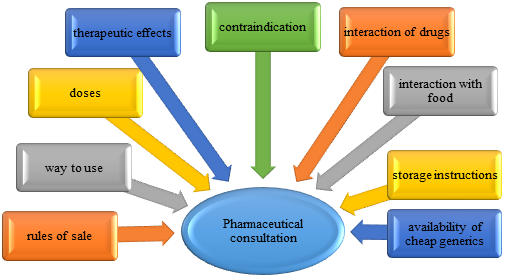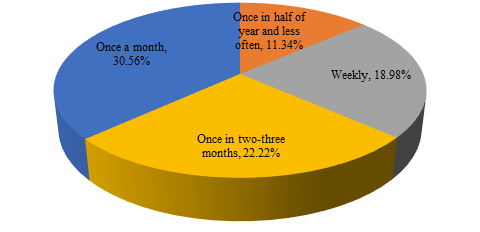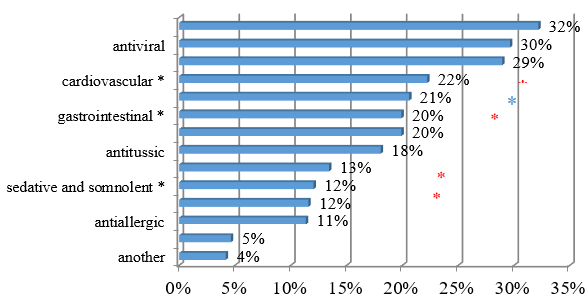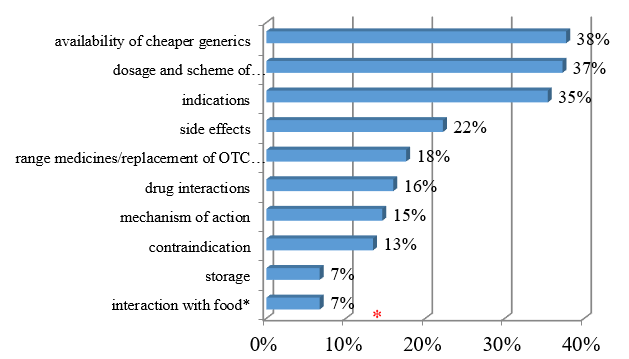Archive \ Volume.11 2020 Issue 2
Problems and the Prospects of Pharmaceutical Consultation in the Drugstores
Soboleva M.S.1*, Loskutova E.E.2, Kosova I.V.2, Amelina I.V.1
1 The Far-Eastern State Medical University, Khabarovsk, 35, Muravyev-Amursky St., 680000. 2 Peoples' Friendship University of Russia medical faculty, Moscow, 8, Mikluho-MaklayaSt., 11719, Russia.
Abstract
Aim: To analyze the main problems and to define the possible prospects of optimization of the function of pharmaceutical consultation in the drugstores. Materials and methods: Questioning of visitors of the pharmaceutical organizations of Khabarovsk. After selection, 432 questionnaires were made. Spearman's rank correlation coefficient of answers of respondents was calculated with their characteristics of age and sex. Results. Pharmaceutical consultations were popular functions for visitors to drugstores, and since March 1, 2017, they have become an integral part of the retail of drugs. According to the results of the research, most of the visitors of the pharmaceutical organizations, which were taking part in the questioning, have been completely satisfied with the rendered service and considered the qualification of the expert enough for carrying out pharmaceutical consultation. Most of the Respondents were often interested in information on the application of therapeutic classes of nonprescription drugs such as nonsteroidal anti-inflammatory, antiviral, and vitamins. Concerning prescription drugs, the greatest need for consultation was observed in a group of cardiovascular medicines. The most widespread questions of visitors of the pharmaceutical organizations were concerned at data on the existence of analogs, indications to the application, and dosage and schemes of application of drugs. The main difficulties in the process of pharmaceutical consultation, according to the poll of patients, were deficient in the assortment, employment of the employee of a drugstore, complexity of the applied terminology, and inability of the expert to ask the specifying questions. At the same time, most of the visitors had no idea of the modern understanding of the standardized pharmaceutical service and were represented generally by traditional ideas of the process of the address to specialists of drugstores. Conclusion: Standardization of pharmaceutical consultation and systematic professional development of employees of drugstores is rational not only concerning organizational requirements and pharmacological aspects of application of drugs but also in the field of improvement of communications with visitors of the pharmaceutical organizations. The optimization of the process of implementation of professional pharmaceutical consultation is necessary. An important component of the consultation is the recommendation of the visit of the doctor.
Keywords: drugstores, pharmaceutical consultation, visitors of drugstores, self-treatment, sociological poll
INTRODUCTION
From ancient times, the use of medicinal plants for the treatment and prevention of diseases has always been interested by human societies in all countries [1]. The issues of prevention and complex treatment of nervous system diseases with the account of a nutritional factor are of current importance [2]. Opportunities and aspects of consultation in the pharmaceutical organizations and powers of experts are widely discussed by the pharmaceutical community. So, scientists around the world from the United States of America and Canada, to Japan, China, and Australia analyze activities of a clinical pharmacist, the prospects of joint maintaining and guardian of patients, participation of experts for prevention of mistakes in the appointment and schemes of application of drugs [3-7]. Medical workers consider the potential perspective of pharmacists in an increase in efficiency of the carried-out medicinal therapy in a few countries of the Middle East [8]. In the Russian Federation a significant number of researches are also devoted to matters [9-12]. Despite permanent processes of reforming a health care system, the problem of responsibility for the availability and rendering the medical and pharmaceutical help, continue to remain one of the most important for our country. For example, according to the data obtained by Finchenko E.A. based on 111 expert cards (medical experts), about who monitor the state of health of the population: citizens – 23.1%, district doctors – 7.9%, specialist doctors – 1.2%, nobody monitor – 67.8% [13]. The current situation leads to self-treatment growth and a lack of control of the compliance and efficiency of the carried-out therapy.
The order of the Ministry of Health of the Russian Federation of 31.08.2016 No. 647n "About the approval of Rules of Good Pharmaceutical Practice of medicines for medical application", come into force since March 1, 2017, regulates the main information components of pharmaceutical consultation (figure 1), the obligation of his carrying out for visitors of the pharmaceutical organizations (at the emergence of such requirement). Therefore, for professional implementation of this function experts need to perform certain labor operations supported with the corresponding knowledge and abilities. According to the order of Ministry of Labor and Social Protection of the Russian Federation from 3/9/2016 No. 91n "About the approval of the professional Pharmacist standard" for providing the population with safe, effective and qualitative drugs, pharmaceutical workers have to carry out five main labor functions, including "informing the population and health workers on drugs and other goods of the pharmaceutical range" (A/04.7). The system of pharmaceutical provision as an integral structure of the macroeconomic complex of the country operates in a dense legislative and legal framework [14]. Among the labor actions focused on interaction with patients are specified: rendering the advisory help with groups of medicines and synonyms within one international non-proprietary name and to the prices of them, according to the usage and the mode of dosage of drugs, their storage in house conditions, concerning indications and compatibility of drugs, to their interaction with food. As the necessary abilities, promoting implementation by experts of this labor function regarding communications with visitors of a drugstore, need of skills on recognition of diseases, the complaints demanding consultations of the doctor, to carrying out information and educational work on promotion of a healthy lifestyle, rational application of drugs is designated. Therefore, in connection with the basic change of regulation of service in pharmaceutical consultation, the determination of important information and organizational aspects and assessment of satisfaction with this service to visitors of drugstores is expedient. A research objective is the identification of the problems, which arise in carrying out pharmaceutical consultation and the definition of prospects of improvement of this function.
MATERIALS AND METHODS
А sociological poll of 432 visitors of drugstores of Khabarovsk (under a special author's questionnaire) is carried out. Processing of primary material was carried out with the use of the Excel 2015 Microsoft Office program; statistical data processing was carried out with the use of a package of SPSS 22 (the Russian-language version). The average value of the age of patients is presented in the form: average ± standard mistake. When carrying out the statistical analysis coding of answers has been applied, the Spearman's rank correlation coefficient is calculated. The correlation of factors, age, and sex of the patient is established at the 2-sided significance < 0.05.
RESULTS
Based on the results of questioning, the typological portrait of the visitor of the drugstore is defined. The middle age was in limits of 37.69±0.74 years. The share of men was 31.50%, women – 68.50%. The social status authentically correlates the patient with age: jobless – 5.56%, the pensioner – 16.44%, students – 18.06%, working – 65.74% (2-sided significance = 0.017).
The question about the number of visits to the doctor and appeals to drugstores for the purchase of medicines has been asked for visitors. The received results were expected - respondents visit the pharmaceutical organizations more often than polyclinics. It is obvious, that at easy indispositions or already known symptoms, the population can directly attend to the drugstore. But, in the independence of the visit reasons, additional responsibility is conferred on workers with people. The distribution of answers of respondents is presented in figure 2. These data demonstrate, that nearly half of respondents (49.54%) visit drugstores once a month and are more often, and the share of consumers with visits once in half a year and less often was only about 11,0%. This proves the availability and demand of the pharmaceutical help in ensuring the medical process, prevention of diseases, and maintenance of a healthy lifestyle. In the analysis of the results of the poll, the significant positive correlation of the number of visits of the drugstore with the visitor`s age was observed (2-sided significance = 0.001).
Despite the high frequency of visits to drugstores, the need for pharmaceutical consultation have estimated as "rare" 38,0% of respondents, and 33.3% of respondents have answered "sometimes". This service is demanded by patients of more senior age (2-sided significance = 0.001). The need in the professional informing, at each visit, arises for 12.0% of patients, and 15.5% of visitors - almost always.
Most often the need for pharmaceutical consultation for respondents arose in the process of the use of therapeutic groups nonsteroidal anti-inflammatory (32.2%), antiviral (29.6%), and vitamins (28.9%) (figure 3). When rating answers of visitors, cardiovascular drugs have entered the first five therapeutic groups although practically all medicines are released according to the recipe of the doctor. The answers were mentioned as most rare: contraceptives, medicines for sexual potency, hemorrhoids drugs, baby food, and cosmetics. The positive correlation of necessity of consultation about the therapeutic group with the patient`s age is established in the following cases: cardiovascular (2-sided significance = 0.001), sedative and somnolent (2-sided significance = 0.001), gastrointestinal (2-sided significance = 0.002), medicines at diseases of bones and joints (2-sided significance = 0.001). The negative correlation has been recorded for drugs used to treat rhinitis (2-sided significance = 0.011), respectively these consultations are required for younger patients. The correlation with the characteristic "a sex of the respondent" was observed for a group of hormonal medicines (2-sided significance = 0.001), naturally, they are more demanding for women. Information about drugs to treat rhinitis was more relevant for men (2-sided significance = 0.010).
In the conducted research the term "information aspects of the use of drugs" was understood as information which is contained in the instruction for application which pharmaceutical experts have to tell the consumer (in language clear to him), because of the necessity for effective and safe treatment, or maintaining the quality of drugs in house conditions. Also, according to paragraph 8g of the Order of the Ministry of Health of the Russian Federation № 647 of 31.08.2016, the need of informing visitors about the availability of medicines of the lower price segment is designated. Distribution of answers of respondents about information aspects of the application of drugs is presented in figure 4. It is established that most often visitors of the pharmaceutical organizations are interested in a range of cheaper generics (37.7%), the scheme of application (37.3%), and drug dosage (35.4%). About a third of patients ask about indications for the application of medicines. Less often consumers interested rules of storage and interaction with food, which is probably connected with the availability of information in the instruction for application for most of the population, or low demand of these data for respondents. Women asked about interaction with food statistically more often (2-sided significance = 0.024).
According to our opinion, the integrity of the medicinal help and competitiveness of the pharmaceutical organization is directly depending on the quality of pharmaceutical consultation. Satisfied with the information service rendered by the expert were 75.2% of respondents, 11.6% - have found it difficult to answer and 10.4% wished to obtain more detailed information. At the same time additional data about drugs and its application, women were interested more often (2-sided significance = 0.015). For carrying out pharmaceutical consultations, enough qualification of pharmaceutical workers was pointed to about 79.9% of respondents, 13.0% couldn't answer. In the analysis of the answers to the matter, a more critical attitude of women to existing informative and communication aspects of this labor service is also revealed (2-sided significance = 0.009).
Certainly, the use of the drugs which are released according to the recipe must be carried out under the control of the attending physician. Therefore, one of the most important functions of the expert in the course of pharmaceutical consultation is the mention of need of visit of the doctor, in case of lack of effect of the use of medicines and/or deterioration in health and for control of efficiency of medicinal therapy. At the same time only 56.7% of respondents have noted a mention by the employee of drugstore about the need of visit of the doctor, have found it difficult to remember this fact of 21.5% of respondents, and 21.0% of visitors have answered that the expert has not indicated the need of medical consultation. The observed situation proves expediency of the introduction of this warning to the patient to standard procedures of pharmaceutical consultation in the drugstores.
Despite the positive assessment of consumers of the process of pharmaceutical consultation, the negative moments have been specified: insufficiency of the range of medicines, employment of the employee of a drugstore, complexity of the applied terminology (figure 5). At the same time statistically valid correlation with sex or age of respondents wasn't observed.
The comparative research conducted by us has shown that results of questioning in Khabarovsk, in many parameters, are comparable with a given sociological poll of visitors of drugstores of Moscow (n=144). In the capital, women (74.3%) with higher education (72.7%) prevailed among respondents. According to a fragment of the results of the Moscow research, the level of credibility to pharmaceutical personnel among the population steadily high that, in general, corresponds to the opinion of visitors of drugstores in Khabarovsk. Nearly 90.0% of all respondents in Moscow marked the trust and compliance of the consultations of pharmacist/druggist. In both regions the relations to consultation, the level of credibility to pharmaceutical consultation, the ranking of information aspects were comparable. Besides, 18.8% of patients in the capital have answered that visit the doctor from 1 to 5 times a month, and the drugstore with this frequency visits by 38.2% of respondents. On the choice of medicine of 36.8% of the visitors of drugstores is based on the recipe of the doctor, 34.0% - my opinion using the Internet, councils of acquaintances, etc., and by consultations of pharmaceutical workers – 29.2%. Results show a high percentage of the visitors preferring self-treatment, despite an opportunity to visit a doctor and the presence of experts in drugstores. From the work of pharmaceutical personnel, these data confirm the need to provide to visitors appropriate consultation about the acquired medicines, to specify symptoms based on which drug was chosen to warn incorrectly and, perhaps, the potentially dangerous choice of medicines.
DISCUSSION
Results of the carried-out questioning have shown that inclusion of pharmaceutical consultation in the structure of medicinal help, has three main problems: substantial (information), it is necessary to have an exact idea and structuring information, which has to be reported to the consumer by each pharmaceutical worker; communication, connected to forming interaction and the relation of the expert and visitor of the pharmaceutical organization; organizational, as standardization of the procedure has to promote uniformity, but at the same time, preservation of personal approach and targeting of assistance to each visitor, taking into account his specific features (age, sex, the social status) is important.
The distribution of answers received in research and correlation of age with the need for pharmaceutical consultation can be based on frequentation of the visit of drugstores by patients of advanced age because of the existence of several chronic diseases and, respectively, need of regular application of drugs. At the same time, the revealed regularities can be caused by active information search about medicines on the Internet by young people and lack of these skills in patients of the senior age groups.
It is established that nonsteroidal anti-inflammatory and antiviral medicines remain the most realized by drugs in the pharmaceutical organizations, as pain is a symptom of many diseases, and the acute respiratory infection is the most diagnosed infectious pathology. Therefore, it is natural, that a need for pharmaceutical consultation about the application of these therapeutic groups has increased.
Besides OTC medicines, the high interest of patients in informing about the rational use of prescription drugs, first, of cardiovascular is observed, that it is connected with the wide morbidity of cardiological pathology among the population of the Russian Federation. The received results prove the need for the development of standards of pharmaceutical consultation at the realization of medicines according to the recipe of the doctor.
It is revealed that for visitors to drugstores, irrespective of the region, the most important information aspects of consultation are the range of medicines, indications to the application, and schemes of usage. Thus, systematic training of experts in the field of the disciplines exerting an impact on rendering service in pharmaceutical consultations such as management and economy of pharmacy, pharmacology, and clinical pharmacology is necessary.
CONCLUSION
Services in pharmaceutical consultation must be rendered in all necessary cases arising in the course of retail of drugs and traditionally are demanded visitors of the pharmaceutical organizations. Nonsteroidal anti-inflammatory, antiviral and cardiovascular drugs were the main therapeutic classes concerning of which most often there was a need for informing. The most important informational aspects were the range, a dose, and indications of the application of drugs. Today, most of the interviewed visitors of drugstores are satisfied with the pharmaceutical consultations provided by experts. Professional implementation of the studied labor function requires the development of standards of her rendering, systematic professional development of pharmaceutical workers, improvement of communicative skills of communication with consumers, adaptation of the applied terminology, and emphasis of attention of visitors of the pharmaceutical organizations to need of visit of the doctor.
Conflict of interests
The authors declare a lack of the obvious and potential conflicts of the interests connected with the publication of the present article.
Financing source
The authors declare a lack of financing.
Compliance with the principles of ethics
Research work conforms to the ethical standards developed according to the Helsinki declaration of the World medical association "Ethical Principles for Medical Research Involving Human Subjects" with amendments of 2000. The epidemiological research was conducted without the participation of people and animals.
ACKNOWLEDGMENTS:
None.
REFERENCES
- Oleg P, Ilona G, Alexey G, Irina S, Ivan S, Vladimir K. Biological Activities of Derived Bioactive Components from Moringa Species: An Overview. Entomology and Applied Science Letters. 2018 Sep 29;5(1):82-7.
- Tokhiriyon B, Poznyakovsky V. Full-Scale Testing of Functional Product in Patients with Vegetative-Vascular Dysfunction and Chronic Cerebrovascular Disorder. International Journal of Pharmaceutical Research & Allied Sciences. 2019 Jul 1;8(3):91-7.
- Clark J.A., Gates B.J., McKeirnan K.C. et al Assessed value of consultant pharmacist services in a home health care agency. Consult Pharm, 2016;31(3):161-7. doi: 10.4140/TCP.n.2016.161.
- Ogunbayo O.J., Schafheutle E.I., Cutts C. et al How do community pharmacists conceptualize and operationalize self-care support of long-term conditions (LTCs)? An English cross-sectional survey. Int J Pharm Pract, 2017;25(2):121-132. doi: 10.1111/ijpp.12283.
- Tan E.C., Stewart K., Elliott R.A. et al Pharmacist consultations in general practice clinics: the pharmacists in practice study (PIPS). Res Social Adm Pharm, 2014;10(4):623-32. doi: 10.1016/j.sapharm.2013.08.00
- Schimmelfing J.T., Brookhart A.L., Fountain K.M.B. et al Pharmacist intervention in patient selection of nonprescription and self-care products. J Am Pharm Assoc, 2003, 2017; 57(1):86-89.e1. doi: 10.1016/j.japh.20108.017
- Kelling S.E., Rondon-Begazo А., DiPietro N.A. Mager et al Provision of clinical preventive services by community pharmacists. Prev Chronic Dis, 2016;13:E149. doi: 10.5888/pcd13.160232.
- Bahlol M.M., Lagutkina T.P. Analysis of pharmaceutical companies’ activities that are directed to physicians in Egypt. Bulletin of Siberian Medicine, 2016;15(1):5-13. doi:10.20538/1682-0363-2016-1-5-13.
- Karakulova E.V., Belousov M.V. Level pharmacoepidemiologic and pharmacoeconomic preparation in the system of post-graduate pharmaceutical education. Journal of Siberian Medical Sciences, 2012;2:60.
- Kononova S.V. New problems of the pharmaceutical market in the old manner. Remedium Privolzhye;4(144):4-5.
- Nevolina E.V. Good pharmaceutical practice. Management of drugstore, 2016;2:58-64.
- Finchenko E.A., Sharapov I.V., Ivaninskij O.I. et al Results of expert evaluation of problems of organization of ambulatory-polyclinic assistance. Bulletin of Siberian Medicine, 2017;16(4):287-293. doi:10.20538/1682-0363-2017-4-287-293.
- Sadovoj M.A., Kobyakova O.S., Deev I.A. et al Patient satisfaction with medical care. Bulletin of Siberian Medicine, 2017;16(1):152-161. doi:10.20538/1682-0363-2017-1-152-161.
- Panfilova H, Hala L, Simonian L, Tsurikova O, Gerush O, Bogdan N. The study of problems and prospects of the pharmacy network development in Ukraine in the context of changing approaches to the state regulation in the retail segment of the national pharmaceutical market. Journal of Advanced Pharmacy Education & Research| Jul-Sep. 2019;9(3):128-135.

Figure 1. Aspects of pharmaceutical consultations

Figure 2. Frequency of visit of the drugstores by respondents

Note: * - age correlation (elderly); * - age correlation (young)
Figure 3. Therapeutic groups of drugs about which use most often there is a need for pharmaceutical consultations

Note: * - gender correlation (women)
Figure 4. Information aspects of the use of drugs
Figure 5. Distribution of opinions of respondents on shortcomings of pharmaceutical consultations
